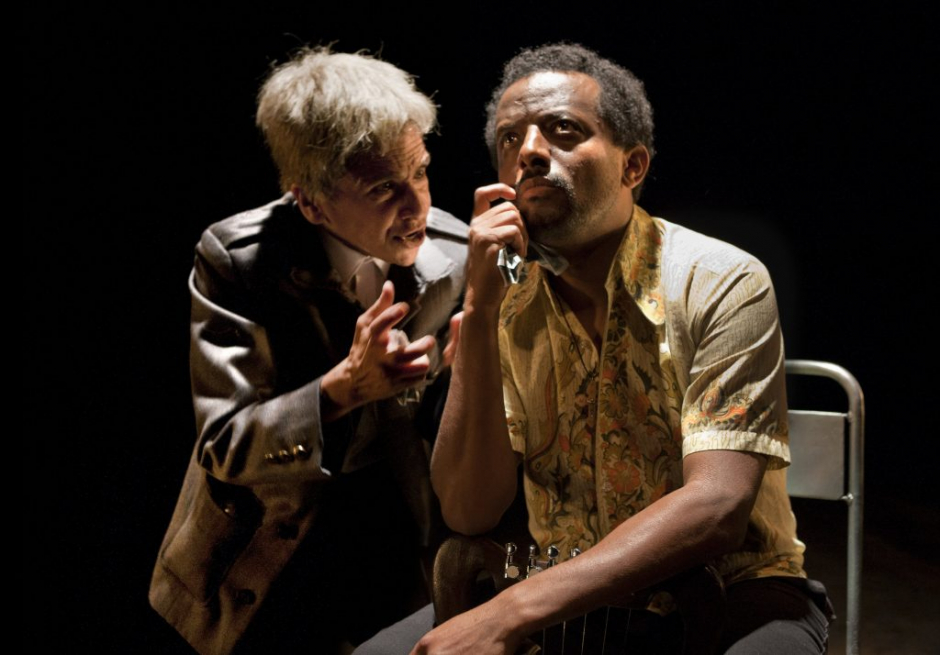The Emperor, by Ryszard Kapuściński, adapted by Colin Teevan and directed by Walter Meierjohann; September 29, 2016.
You don’t need to know much about Haile Selassie to enjoy Kathryn Hunter’s performances in The Emperor, a one-hour, almost one-woman show in which she dons many hats (and shoulder stripes, and walking sticks, and epaulettes, and fly wisks) to paint a picture of life in the King’s court, refracted through the eyes of his employees.
Adapted by Colin Teevan from Ryszard Kapuscinski’s 1978 book of the same name, Hunter is variously the emperor’s time-keeper, the minister of information, the emperor’s pillow bearer and, perhaps most particularly, the emperor’s valet de chambre, an elderly man who traverses the stage with a walking stick and regales us with the tale of his own downfall, in a conscious echo of the man whom he so obviously holds in such high esteem, alongside many others.
To begin with, Hunter flits from character to character at speed and we have a sense of the court in the accumulation of stray details – the placing of cushions, the wiping up of urine. Gradually the narrative settles and Heili Selassie himself begins to emerge: a character we never actually see onstage, formed from the rags and patches of the people he rules over most intimately, and of those who moved about his orbit each day. And as he emerges – perhaps as we hear the story of the poor, and how they were given envelopes of money, only to discover they were empty after they had left the palace – we see that The Emperor is a story of power, and how power corrupts.
If you are of a certain age, if you grew up in the 70s as I did, you’ll be aware of the terrible famine that swept Ethiopia in that decade – and possibly even Jonathan Dimbleby’s 1973 documentary The Unknown Famine. The reaction to Dimbleby’s documentary is dramatised here: Selassie’s Minister for Information – who becomes one of the most significant characters as the action progresses – holds a press conference that comes to centre on the death of his own son, a student at the Selassie university who took part in protests against the government and was gunned down, an action that saw father having to apologise for son.
The play undoubtedly charts the fall of Selassie, and yet it manages to chill and amuse in equal measure. A long white curtain is drawn across the stage as we accompany Selassie and his servant as they engage with the international scene – prompting Hunter to break the fourth wall in a way that makes a typical theatre audience deeply uncomfortable – and it is (eventually) fun, provoking some of the bigger laughs of the evening. As the people of the country starve, Selassie chooses development projects like hospitals, airports and bridges over human life, because hospitals, airports and bridges will still be there long after the starving people and even the king himself have gone. You can’t help but consider the current situation in Britain. “Fuck Brexit,” Hunter yells at one point. She is preaching to the converted at HOME.
Hunter deserves an extraordinary amount of credit for her almost one-woman show (her performance has been called the best of 2016 – and it must certainly be up there) but she has solid support from Temesgen Zeleke, who punctuates the production with live music and plaintive song. Zeleke’s music – and the ease with which it allows Hunter to switch a hat for an epaulette, to stand, to sit, or to flirt coquettishly with the audience – would be enough to praise him. But he also performs alongside Hunter, mostly peripherally it has to be said, and his turn as the Minister of Information’s son is sharp with comedy and rebuke.
Hunter’s performance and Zeleke’s music alone is enough to warrant a high recommendation, but director Walter Meierjohann is, we sense, someone who wanted the total production to hit home as powerfully as possible; and every aspect The Emperor does hit home, and hard. The lighting (see Hunter bestriding a stage that could just as easily be a boxing rink); the sound (the distant hum of electronic noise, people in the street, gunfire); the cinematic devices (a typescript that trails each major part of the play, the nuanced use of the Dimbleby documentary which we watch together with “Selassie,” or at least we are told that he is watching), all add up to make this more than the simple sum of its accomplished parts.
So: you should see The Emperor for Hunter’s many performances. Yes. But know that these performances are not your sole reason for watching. Hunter is terrific but so is Zeleke, and so is Teevans, and so is Meierjohann, and so are the dozen or so people who have all come together to make this genuinely impressive production.

